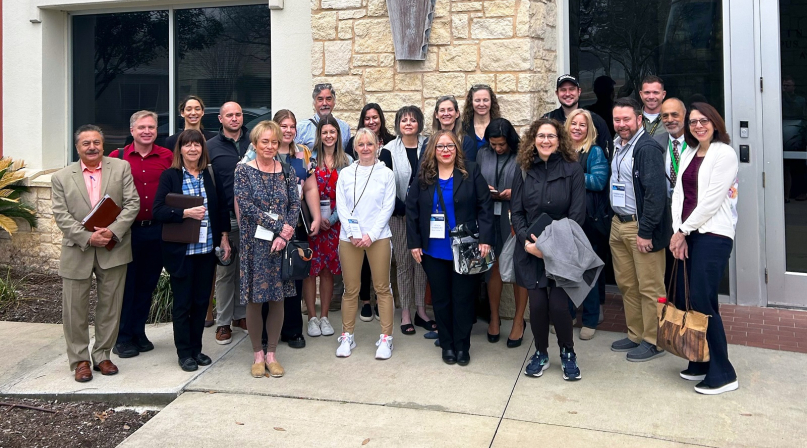Familiar Faces network explores behavioral health systems of care at Texas meeting
Upcoming Events
Related News

Key Takeaways
Bexar County, Texas, a Familiar Faces Initiative Peer-Learning Site, models effective cross-sector data-sharing and familiar faces programming to divert residents with behavioral health conditions from justice system involvement to treatment.
The name of the initiative, Familiar Faces, refers to individuals who frequently cycle through jails, homeless shelters, emergency departments and other crisis services. Over time, these individuals become familiar faces to county workers in these sectors.
The Familiar Faces Leadership Network, a cohort of 13 elected officials, participated in a peer exchange in Bexar County to learn how the county partners with leaders across sectors to support a robust behavioral health continuum of care.
Developing a behavioral health system of care
The Southwest Texas Regional Advisory Council oversees the trauma and emergency health care system in 22 counties, including Bexar. Over the last decade, council leadership has partnered with local hospital systems to address increases in the number of mental health patients within their emergency health systems.
A study revealed that the behavioral health crisis was more pervasive than initially understood — the same individuals were frequenting all hospitals, not just a single location. To tackle the challenge, the advisory council created the Southwest Texas Crisis Collaborative, a behavioral health care system, representing Bexar County, the City of San Antonio, all major health care systems, philanthropy, public safety leaders and behavioral health providers.
The collaborative shares information across participating entities through an Organized Healthcare Agreement. The shared data is used to identify familiar faces for targeted programming, gaps across the system and solutions to improve system efficiency and outcomes. All participating entities contribute data and funding to support the sustainability of the system.
Addressing social determinants of health
Through partnerships, Bexar County operates a co-responder team, mobile crisis response unit and Restoration Center — a 24-hour, one-stop diversion center where law enforcement can drop off individuals in need of crisis care who have access to the minor medical clinic or sobering unit. These services divert individuals with behavioral health needs from the criminal legal system to providers that can address the full spectrum of social determinants of health.
Haven for Hope is a transformational campus for people experiencing homelessness and serves 1,700 people a day. The Familiar Faces Leadership Network toured the campus, which was designed as a “small town,” offering services from an acute medical care station to a barber shop. The courtyard, a low-barrier shelter, is open to anyone who needs a safe place to sleep and offers three meals a day, laundry services and mental health care. Transitional housing is available for those engaged in treatment and housing and financial planning. Over 13,000 clients have moved to permanent or other transitional housing since the campus first opened in 2010.
Support for Justice Involved Individuals
Behavioral health services are also available to individuals who are arrested and not immediately deflected. The Justice Intake and Assessment Annex, located at the county jail, screens people for potential diversion at booking. The Prosecutor’s Office at the annex is open 24/7, so that people who are eligible for diversion are processed quickly through the system. The Office of Pretrial Services is also located within the jail and available to individuals while they await charges. Furthermore, Bexar County operates the Reentry Center one block from the exit of the jail where people returning to the community or the public can connect to services; the top four services provided are:
- Food, hygiene and clothing assistance
- ID recovery
- Mental health services
- Utility support
Bexar County ensures availability and access to services that address people’s social determinants of health through county investments and partnerships that support a comprehensive behavioral health system of care. More information about Bexar County’s efforts (https://familiarfaces.naco.org/resources/case-study-bexar-county-texas/) and the Familiar Faces Leadership Network are available on the website: https://familiarfaces.naco.org/. This peer exchange was generously supported by Arnold Ventures.
Attachments
Related News

CMS requires state Medicaid suspension upon arrest versus termination
Effective January 1, 2026, federal law now requires states to suspend, rather than terminate, Medicaid coverage when an individual is incarcerated.

County Countdown – Dec. 15, 2025
Every other week, NACo's County Countdown reviews top federal policy advocacy items with an eye towards counties and the intergovernmental partnership.
